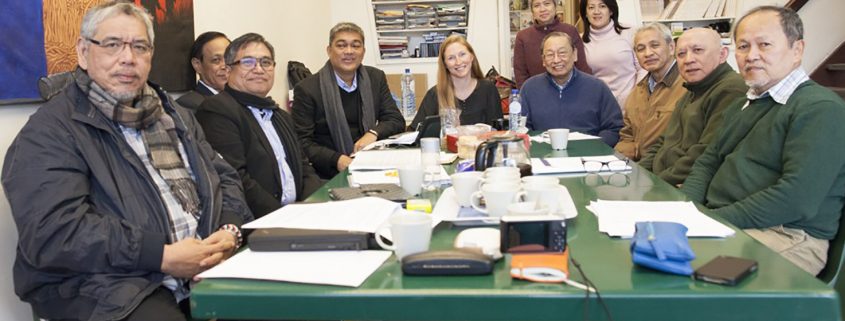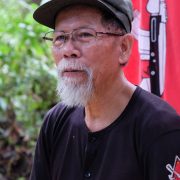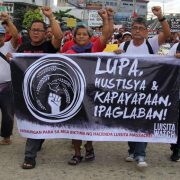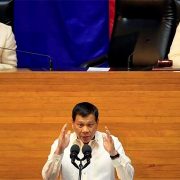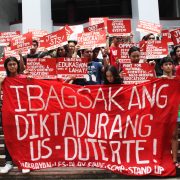NDFP wants human rights monitoring committee with GPH revitalized
THE NATIONAL DEMOCRATIC FRONT OF THE PHILIPPINES (NDFP) will push for the revitalization of the Joint Monitoring Committee (JMC) for its Comprehensive Agreement on Respect for Human Rights and International Humanitarian Law (CARHRIHL) with the government of the Government of the Philippines (GPH) under the Rodrigo Duterte government.
As the NDFP waits for representatives of president-elect Duterte to visit its international office in Utrecht, The Netherlands, its spokesperson said that they want the JMC to be both revitalized and re-strengthened.
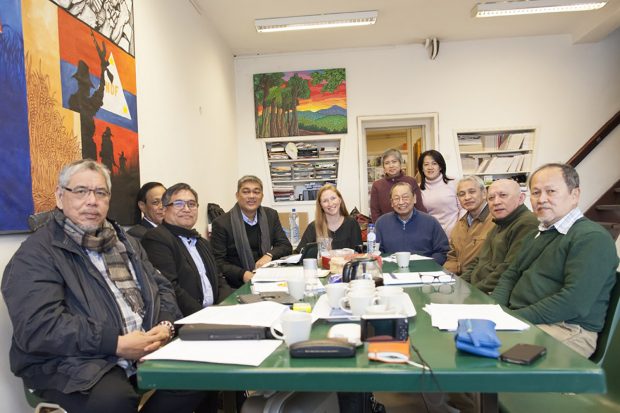
GPH, NDFP and RNG representatives during the signing of the draft “Joint Agreement on the Resumption of the Formal Talks on the Peace Negotiations between the GPH (Government of the Philippines) and the NDFP” in December 2014. The Aquino government rejected the document. (Photo by Jon Bustamante/Kodao Productions Europe Correspondent)
“We want the JMC to be convened, so it can finally monitor human rights violations in connection with the peace talks and the possible ceasefire,” NDFP spokesperson Fidel Agcaoili said.
The JMC was jointly formed by the NDFP and GPH under then president Gloria Macapagal Arroyo on February 14, 2004 after the agreed to resume formal talks with the NDFP.
With the assistance of the Royal Norwegian Government (RNG), third party facilitator of the peace negotiations, the JMC then formed its Joint Secretariat (JS) in July of that year to provide technical and administrative assistance to the committee.
Despite its agreement to meet every three months, however, the JMC was not allowed to convene since 2004.
The JS on the other hand continues to accept complaints of human rights violations against either the GPH or the NDFP.
A total of 6,397 human rights violations complaints have been filed at the JS office in Cubao, Quezon City, as of last May 23.
A total of 4,471 complaints have been filed against the GPH while there have been 1,926 against the NDFP.
Many of the complaints against the GPH were connected to retired Major General Jovito Palparan and the various units under his commands during the Arroyo government.
GPH’s effort to close JS
Agcaoili revealed that the Benigno Aquino government even asked the RNG to terminate its support for the JS.
“The RNG disagreed with the proposal. They told the GPH they could not unilaterally cease their support of the JS as it is part of the agreement enshrined in the CARHRIHL,” Agcaoili said.
He added that the RNG reminded the GPH that closing down the JS must be a mutual decision of the parties to the CARHRIHL.
Atty Silvestre Bello III, named by Duterte to head the GPH negotiating panel with the NDFP, earlier told Kodao he will ask the incoming government to honor previous signed agreements with the NDFP such as the CARHRIHL.
Bello was chairperson of the GPH negotiating panel under the Fidel V. Ramos government when it signed the CARHRIHL with the NDFP.
Agcaoili said that JMC’s existence is a way for the Filipino people to hold both the GPH and the NDFP down on their signed commitments.
“The JMC is a component of the CARHRIHL, so it is very important,” he said.
The CARHRIHL is the only substantive agenda to have been signed by the NDFP and the GPH since both parties signed The Hague Joint Declaration in 1992.
Aside from human rights, the declaration listed three other substantive agendas to be agreed upon, namely socio-economic reforms, political and constitutional reforms, and on end of hostilities and disposition of forces.
Added role for the JMC
The NDFP spokesperson also said that he sees an expanded role for the JMC if their negotiations with the Duterte government succeed.
“Should the peace negotiations agree to a ceasefire, we need to have a monitoring committee on its implementation,” Agcaoili said.
“If both parties agree, it is possible that the JMC may take on this role as well,” he added. (Raymund B. Villanueva)

